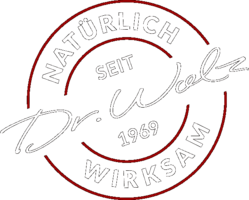Vitamin D3 1000 I.E. plus
For the immune system1
For normal muscle function2
For healthy bones in adults and children3, 4

Package size: 60 capsules
One capsule daily is sufficient to cover the daily requirement of vitamin D.
Gluten-free, free from lactose, gelantine and colorants.
Vitamin D is an all-rounder vitamin: traditionally is had been used to support bone health. In the meantime, recent studies show that vitamin C supports many functions in the human body.
Vitamin D is important for muscles, teeth and the immune system. Especially during the dark season it is important to supplement vitamin D. Dr. Wolz offers high-dosed vitamin C that supports growth and bone development in children. It is suitable for the whole family. The lanolin (wool fat of sheep) in Vitamin D3 1000 I.E. plus Dr. Wolz is extracted traditionally.
How much vitamin D does a healthy person need ?
Normally, the vitamin D level should be in between 30 and 50 μg/l.
Individuals that frequently have a vitamin D deficiency:
- Children + young people
- Immobile people
- The elderly
- Pregnant + breast-feeding woman
- Menopausal women
- Athletes

Package size: 60 capsules
One capsule daily is sufficient to cover the daily requirement of vitamin D.
Gluten-free, free from lactose, gelantine and colorants.
What do humans need vitamin D for?
Vitamin D is of great importance for the human body because many physical functions depend on a good vitamin D level. Certain metabolic processes also require vitamin D. Vitamin D is important for children to support growth and healthy bone development, as well as for older people. Vitamin D supports your immune system and therefore is recommended to anyone with an increased need such as pregnant women, breast-feeding women, women in menopause and atheltes should supplement vitamin D.
Adequate intake of vitamin D
Our body is able to produce vitamin D with the help of the sun (UVB rays), which is why vitamin D is also called the "sun-vitamin". Through food, vitamin D can mainly be absorbed by eating fish. Dairy products contain small amounts of vitamin D. Vitamin D is converted into its active form in our liver and kidneys.
Due to many reasons, it can be really difficult to maintain a high level of vitamin D in the blood. In the dark season the sun light is often too weak to produce enough vitamin D in the skin. Even in summer, skin of old people can no longer produce as much vitamin D as the skin of young people. In addition to that, many people have a lack of vitamin D unbalanced or unhealthy diet – most people consume too little vitamin D-rich foods such as fish or liver. Vitamin D3 1000 I.E. plus from Dr. Wolz contains as much vitamin D as you could ingest with consuming 150 g salmon or 100 g hering.
How does the vitamin-D-metabolism work?
Our body either absorbs vitamin D3 (colecalciferol) or vitamin D2 (ergocalciferol) through sunlight or foods. In the liver, they are both converted into their stored form (serum = 25(OH)D3). Vitamin D levels can be measured by means of blood work. Vitamin D is converted into the active hormone (Calcitrol = 1,25 (OH)2 D3) in the kidney.
Vitamin D3 is gained from lanolin
Lanolin is known as wool grease or wool fat. It is produced in the sebaceous glands of sheep and protects them from bad weather, because it generates thick fur. In order to recover lanolin from the freshly shorn wool it has to be washed multiple times – this is the only possibility to get to the wool fat. Afterwards lanolin can be used in supplements and the wool can be used seperatly.
Active ingredients
One capsule contains vitamin D3 (1000 I.E.) 25 µg, citrus bioflavonoide 36 mg and vitamin C from acerola cherry powder 40 mg. The capsule shell is made of plant-based cellulose.
Recommended intake
Adults take 1 capsule daily with a meal and some fluid. Children at the age of 3 and older take 1 capsule every other day. The capsules can also be opened by pulling them apart so the content can be ingested with food or drinks.
A varied, balanced diet and a healthy lifestyle are important for health.
1 Vitamin D contributes to normal functioning of the immune system.
2 Vitamin D has a function in cell division.
3 Vitamin D contributes to maintaining normal bones and teeth.
4 Vitamin D contributes to the maintenance of normal muscle function.
5 Vitamin D contributes to normal calcium levels in the blood.

